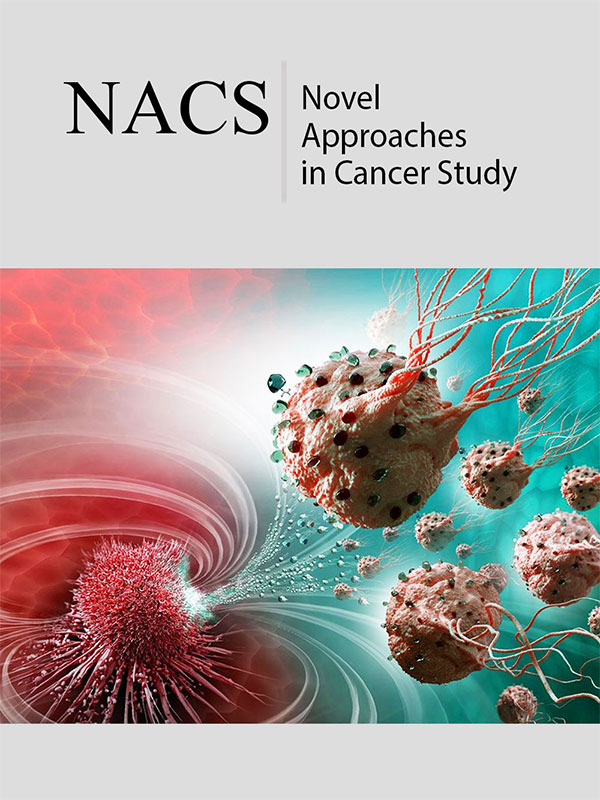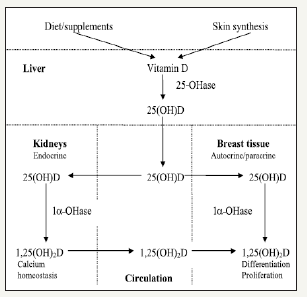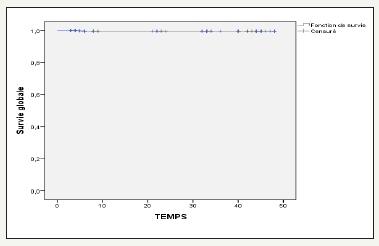- Submissions

Full Text
Novel Approaches in Cancer Study
Vitamin D and Biphosphonate in Neoadjuvant Advanced Breast Cancer
Selma Sakhri*
Medical oncology, Algeria
*Corresponding author:Selma Sakhri, Medical oncology, Algeria
Submission: April 09, 2018;Published: June 19, 2018

ISSN:2637-773XVolume1 Issue4
Abstract
Vitamin D and calcium deficiency is associated with increased breast cancer risk and decreased breast cancer survival. The purpose of this study is to determine whether the addition of vit D and Zoledronic acid (ZA) to neoadjuvant chemotherapy (NACT) gives complete histological responses. We report a prospective evaluation comparing complete pathological response between different biomolecular sub-groups.
Patients and Methods: The study included 431 women with stages III locally advanced breast cancer who received neoadjuvant chemotherapy and Zoledronic acid. All patients were prescribed vitamin D3 (cholecalciferol) 400 IU and calcium carbonate 1,000 mg daily. The main objective is the complete histologic response. Secondary end points were the over all survival of patients targeted by the study.
Results: Histologic complete response with Zoledronic acid and vit D was 40.13% the higher in the subgroup Her 2/luminal (RH±Her2+) and under Her2+ (HR-Her2+) and the lowest rate was observed in the triple negative group as classified by Sataloff, overall survival was 45.77 months for subgroups (Her2 / luminal and in Her2 + group) vs 44.11 months for triple negative group.
Conclusion: Our study confirms the potential protective and antiproliferatif effects with vitamin D and Zoledronic acid in neoadjuvant advanced breast cancer.
keywords: Zoledronique acid; Breast cancer; Neoadjuvant chemotherapy; Vitamin D; Calcium
Introduction
figure 1:Antitumor effects of vitamin D.

Preclinical studies support various antitumor effects of vitamin D and Zoledronic acid (Neoazure trial) in breast cancer (BC) such as inhibition of cell proliferation, induction of cell differentiation, promotion of apoptosis, decreasing inflammation with down regulation of cyclooxygenase-2, decreasing of angiogenesis, inhibition of estrogen pathway and also inhibition of invasion and metastasis [1,2]. Due to the increasing concern of the role of vitamin D in the development and prognosis of the BC, also it enhances chemotherapy induced cell death by increasing the pathologic complete response (PCR). Pubmed search. Because of the intracellular effects on breast cancer cells and the in vitro and in vivo experiments demonstrating enhancement of chemotherapeutic cytotoxicity with vit D pretreatment, we hypothesized that low vit D levels would be associated with impaired response to chemotherapy and more aggressive breast tumor biology resulting in higher relapse rates among women with vit D deficiency (Figure 1,2).
Methods
From 2012 to 2014, 432 patients received neoadjuvant chemotherapy + Zoledronic acid and vitamin D. The primary end point was to determine the relation between vit D + Calcemia levels and pathologic complete response. (PCR) when adding Zoledronic acid.
The secondary end point was the overall survival. Of all patients (N = 438), 432 received neoadjuvant chemotherapy + vitD and zoledronic acid. Six of them have progressed after chemotherapy treatments and 04 are excluded from the study, at the end of neoadjuvant chemotherapy, a patient refused surgery therefore no assessment of pCR in this patient who is the main objective of our study, a total of 7 patients study outputs, so it remains 431 who have had a mastectomy with lymph node dissection seen the very advanced stage of the tumor (IIIA, IIIB, IIIC) and the appointment of delay Involved in the period radiotherapy (7- 15-month). No conservative treatment has been practiced. The median follow-up of patients was 42 months.
figure 2:Diagram of vitamin D metabolism.

Result
The pathologic complete response rate was 40.13% according to classification Sataloff (1995) .We found that the pathologic complete response rate was the highest in the subgroup (Her2 / luminal) and (Her2 +) and the lowest rate in the triple negative group as classified by Sataloff. These results are consistent with a single study of literature is the study Rouzier (10) where the pathological complete response to neoadjuvant chemotherapy in patients who overexpressed Her2 + is obtained even in the absence of trastuzumab. This leaves suggest that the answer is guided by specific biological factors in Her2 + tumors and zoledronic acid plus vit D may play a role in inhibiting tyrosine kinases with its potentiation of treatment. Thus the triple negative patients are insensitive to zoledronic acid and vit D in neoadjuvant. The average duration of progression-free survival was also significantly in the subgroup (Luminal -Her2, Her2) to the triple negative. It is 45.18 months in the group (luminal - Her2 +) vs 38.95 in the triple negative group. As against the overall survival has improved in the 4 groups with 45.77 months for (luminal - Her2), 45.32 months for Her2 group, 44.37 months for luminal and 44.11 months for the TN group higher compared to the literature or overall survival of 30 months TN. SG month: Luminal / Her2; luminal; Her2 vs TN = 45.18 months [45.15 to 46.21]; 45.26 months [45.03 to 46.50]; 44.18 months [40.06 to 45.30] vs 40.11 months [36.16 to 41.06] (95%) (Figure 3,4).
figure 3:SG (Global Survival) Avg = 45.07 months [43.54 to 45.81] (95%).

figure 4:SG (Global Survival) Avg = 45.07 months [43.54 to 45.81] (95%).

Conclusion
Our study suggests that vit D associated with Zoledronic acid predict the efficacy of NACT in breast cancer patients; showing synergic antitumor activity. To further confirm the potential protective effects of calcium and vitamin D on breast cancer, well-designed cohort studies and clinical trials are warranted.
References
- Colman R (2010) The effects of zoledronic acid to neoadjuvant Adding chemotherapy on tumor response: exploratory evidence for live antitumor activity in breast cancer. Br J Cancer 102(7): 1099-1105.
- Yan C, Thomas ER (2006) Vitamin D, calcium, and breast cancer risk: A Review. Cancer Epidemiology, Biomarkers and Prevention 15(8): 1427- 1437.
© 2018 Selma Sakhri. This is an open access article distributed under the terms of the Creative Commons Attribution License , which permits unrestricted use, distribution, and build upon your work non-commercially.
 a Creative Commons Attribution 4.0 International License. Based on a work at www.crimsonpublishers.com.
Best viewed in
a Creative Commons Attribution 4.0 International License. Based on a work at www.crimsonpublishers.com.
Best viewed in 







.jpg)






























 Editorial Board Registrations
Editorial Board Registrations Submit your Article
Submit your Article Refer a Friend
Refer a Friend Advertise With Us
Advertise With Us
.jpg)






.jpg)














.bmp)
.jpg)
.png)
.jpg)










.jpg)






.png)

.png)



.png)






